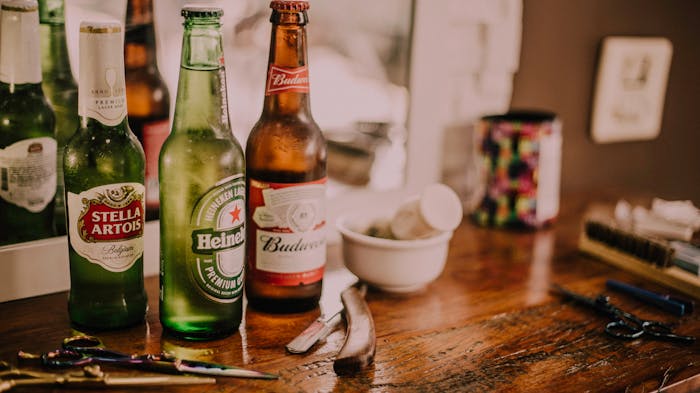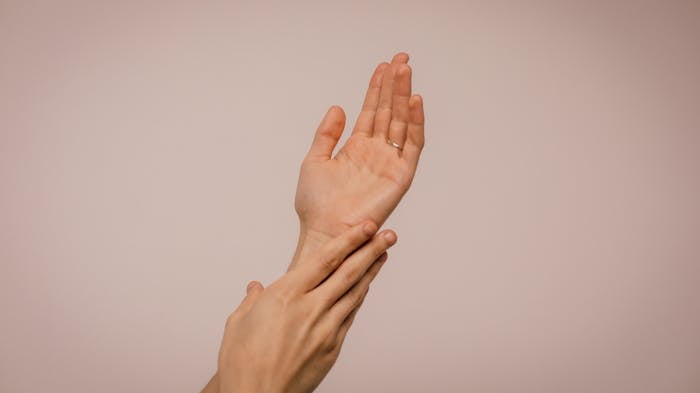Can Alcohol Cause Rashes?
Alcohol addiction [1] is a debilitating disease that affects people of all ages, demographics, classes, and more globally.
The effects of alcohol addiction are multivarious and each subject will experience unique symptoms.
The symptoms that are most commonly associated with drug and alcohol addiction include but aren’t limited to anxiety, depression, headaches, irritability, aggression, delirium tremens, and even seizures.
However, alcohol addiction isn’t the only health issue related to alcohol consumption.
While these are severe signs of addiction, casual and moderate alcohol drinkers will experience a range of adverse health effects.
Alcohol can also cause a range of skin issues regardless of whether someone is consuming it in excessive quantities.
Can Alcohol Cause Rashes?

Yes, alcohol can cause rashes among other skin conditions. Alcohol can cause or aggravate skin conditions and flare-ups. However, there are many factors at play.
These factors include whether patients have pre-existing chronic skin conditions, how susceptible they are to alcohol, and more.
While someone may question whether alcohol can cause rashes and red skin, these can be indicators that someone is consuming alcohol excessively.
Dry and red skin is a common visual sign that someone is suffering from alcohol addiction. Enlarged blood vessels cause the face to have redness.
What Alcohol Does To Our Skin
How does alcohol cause rashes, someone may ask? There are many chemical changes in the brain and the body when we consume alcoholic substances.
While the central nervous system goes into a more relaxed or depressed state, organs in our bodies may have to work harder to negate the effects of alcohol.
Here are some of the things that happen to our bodies when we consume alcohol:
- Inflammation: Alcohol has a profound effect on our immunity and levels of inflammation [2]. The liver and the brain in particular suffer due to organ dysfunction as a result of alcohol consumption, and it can also stimulate the release of histamines. This can trigger inflammation and discomforting skin conditions.
- Dry Skin: Alcohol is a diuretic and can dehydrate us quickly, leaving us with dry skin. The reduction of moisture in our skin can lead to a reduction of elasticity, and dry skin can further trigger skin conditions. This is also known as Xeroderma [3]. It also deprives us of vitamins and nutrients which leads to further skin issues.
- High Blood Pressure: Alcohol also increases our blood pressure. Blood pressure is often related to a range of skin conditions such as psoriasis [4]. There is also a strong connection between stress and high blood pressure (hypertension). Both of these can increase inflammation and worsen skin conditions and appearance.
- Increased Cortisol Levels: Our lifestyle (including excessive alcohol consumption) can increase our levels of stress and the hormone cortisol [5]. Cortisol levels can lead to greater inflammation and exacerbate the effects of particular skin conditions and organ health in general. Acne is common among those suffering from stress.
- Allergic reaction: Many people are also intolerant to alcohol without realising, suffering from allergic reactions from mild to more severe cases. Allergic reactions and intolerance to alcohol can lead to skin issues such as red skin, itchiness, severe rashes, or more severe health effects such as collapsing.
How Vitamin Deficiencies Lead to Rashes
Another factor to consider is that someone who frequently and excessively consumes alcohol may suffer from nutrient deficiencies.
This is because alcohol can impair the digestive system, preventing us from absorbing valuable nutrients for our organs.
A study focused on alcohol-related skin conditions and discovered that Vitamin C deficiency is common among alcohol users [6].
However, the supplementation of Vitamin C helped minimise the severity of these skin rashes. This shows that diet also plays an important part.
According to Harvard Health [7], there are many benefits for the skin to be had by Vitamin C.
Vitamin C can improve skin health by minimising acne due to its anti-inflammatory properties, and it can also negate the effects of other triggers such as pollution and sun damage.
Common vitamins and nutrients deficient in chronic alcohol drinkers include:
- Vitamin C: This vitamin can stimulate collagen synthesis [8]. However, chronic alcohol drinkers often show signs of Vitamin C deficiency [9].
- Vitamin B: Vitamin B can support skin health, balance natural oils, and support the skin’s barrier. It is common for patients with dry skin to consume vitamin B supplements. In addition to skin issues, alcohol addiction conditions such as Wernicke Korsakoff syndrome (or wet brain syndrome) come from issues such as alcohol-related Vitamin B deficiency [10].
- Zinc: This chemical can reduce ace, and inflammation, and also boost collagen production which supports skin health. It boosts skin elasticity and supports immune health to help us combat illnesses.
Types of Skin Issues Related to Alcohol

There are many different skin conditions and problems related to alcohol. Here are some of the most prevalent skin conditions among alcohol users:
- Psoriasis & Seborrheic Dermatitis: Excessive alcohol intake is a risk factor for developing psoriasis or seborrheic dermatitis [11]. The cause of psoriasis is still unknown in many cases, but it is thought to be a form of autoimmune disease. Psoriasis is an inflammatory skin disease and the consumption of alcohol will only trigger a worse response, and studies show that high alcohol consumption is common for individuals with psoriasis [12].
- Eczema: While alcohol is not thought to be the only direct cause of this condition, it can certainly make eczema [13] symptoms worse. Consuming alcohol dilates the blood vessels and dries out the skin, which can intensify eczema symptoms such as itching.
- Rosacea: Studies also suggest that drinking alcohol leaves you at a higher risk of developing rosacea [14]. Scientists compared a group of drinkers and non-drinkers and discovered that drinkers are more likely to have rosacea. Similarly, another study was conducted with over 200 sets of twins, one which would consume alcohol and the other would not, and the rates of rosacea were higher among those who did consume alcohol.
- Hives: Hives, or Urticaria, are often due to an allergic reaction to alcoholic substances. When suffering from hives or urticaria, red rashes may develop over the drinker’s body.
- Facial Flushing: Flushing is common among alcohol drinkers. This is when the alcohol stimulates the release of histamine in the body, which can cause red, itchy, and inflamed skin.
- Skin infection: Studies show that patients who are suffering from alcohol addiction are much more likely to suffer from skin infections. This is largely due to vitamin deficiencies and a compromised immune system.
- Cellulitis: Cellulitis is a bacterial skin infection that is seen on the lower legs and the feet of the subject. The skin becomes red and swollen, and infections can often be serious requiring antibiotics. Studies also suggest that patients suffering from liver cirrhosis (largely due to chronic alcohol consumption) are more likely to develop cellulitis [15].
How to Treat Skin Conditions and Inflammation
If you are suffering from rashes and skin conditions, you must seek medical help. Only once you seek the diagnosis guidance of a medical professional should you take it upon yourself to treat your condition.
Mistreatment can worsen conditions. It’s important that you receive a diagnosis so you are able to understand the severity of the condition, and how to treat it adequately.
However, there are ways you can treat or minimise common skin conditions and inflammation at home.
- Medicated Cream & Shampoo: Patients may be suggested to take anti-fungal cream or coal tar to minimise redness, rashes, and flaking on the skin. If patients are suffering from psoriasis or seborrheic dermatitis, they may be prescribed or recommended medical shampoos such as Nizoral. However, patients should not use these medicated shampoos on open wounds.
- Green tea: Whether ingested or applied directly to the skin, green tea offers numerous benefits for the skin. Green tea [16] has anti-inflammatory properties which can reduce redness, irritation, and acne, as well as boost skin regeneration because of its Vitamin E.
- Minimise caffeine: Consuming caffeine may be the cause of rosacea for many people. Caffeine is also a diuretic, which can dehydrate us and reduce the level of moisture in the skin.
- Improve your diet: Low-quality and ultra-processed food can impact our skin in many ways. A diet consisting of fast food and saturated fats can not only worsen our skin health but compromise our immune system. Patients may also be gluten or dairy-intolerant, which can cause significant inflammation and breakouts on the skin.
- Improve your sleep: Sleeping is arguably the best remedy for a range of conditions. It’s important that patients aim for 7-8 hours of uninterrupted sleep per night. Studies show that people who regularly get sleep quality show fewer signs of ageing and better skin barrier health [17] than those who sleep poorly.
- Stay hydrated: Hydration is an overlooked aspect of many people’s health. Even if we drink lots of water, consuming coffee, alcohol, and high-sodium foods can negate this. Hydration can improve skin health by reducing itchiness, flaking, and by improving elasticity.
How to Overcome Alcohol Addiction

Alcohol addiction can be a symptom of other issues, such as mental health issues, poor life quality, genetic disorders, trauma, and more.
In order to combat alcohol addiction, not only do we need to abstain from alcohol, but we need to address its root causes.
Going to a drug and alcohol rehab will maximise your chances of recovery:
- Medicated detox: At a drug and alcohol rehab, patients will undergo a medicated detox to help them recover and allow toxic substances to withdraw from their bodies. They will undergo medical supervision and prescribed medication to minimise withdrawal symptoms.
- Therapy & Counselling: After a medical detox, they will undergo a range of therapies such as Cognitive and Dialectical Behavioural Therapy. They will discuss their addiction with a licensed counsellor who personalises the session to their unique needs. This will teach them healthier coping mechanisms which will form a healthy lifestyle structure.
- Relapse Prevention Planning: Overcoming addiction is only half the battle, and patients will need to learn about a range of ways to prevent a relapse from taking place. Relapsing is common among addiction patients, however, it isn’t a sign that treatment has failed.
- Aftercare: Patients will continue to receive support in the form of a 12 month aftercare programme following rehab treatment. This will provide them access to support sessions at fellowship programmes, active lifestyle engagement strategies such as the 12-Step Programme, and more.
Combat Alcohol Addiction Today
Contact us today and we can overcome addiction together. With our dedication and expertise combined with your intrinsic motivation, we can optimise your treatment options and addiction recovery.
Overcoming addiction is a difficult task, especially when doing so alone. Whether you require inpatient or outpatient care at a drug and alcohol rehab, we can help tailor your recovery programme to your unique needs.
Call us today by dialling the number 0800 088 66 86 and we can overcome addiction together.
When you call us, you are free to ask questions about the addiction recovery process to our friendly and dedicated staff members.
When you are comfortable and confident enough to do so, we will help you conduct a free health assessment which will help you decide what form of treatment you need.
The health assessment is done free of cost, and can be done over the phone from the comfort of your own home.
It is a simple questionnaire consisting of your physical and mental health, current condition and addiction history, medical history, and more.
References
[1] Alcoholism and Alcohol Dependence – Rehab Recovery https://www.rehab-recovery.co.uk/addictions/alcoholism/
[2] Alcohol and Gut-Derived Inflammation https://www.ncbi.nlm.nih.gov/pmc/articles/PMC5513683/
[3] Xeroderma https://www.ncbi.nlm.nih.gov/books/NBK565884/
[4] Psoriasis and High Blood Pressure https://www.ncbi.nlm.nih.gov/pmc/articles/PMC4384847/
[5] The Relationship Between Alcohol Consumption and Cortisol Secretion https://www.ncbi.nlm.nih.gov/pmc/articles/PMC2266962/
[6] A Reversible Cause of Cutaneous Rash in a Patient with Alcohol Consumption https://www.ncbi.nlm.nih.gov/pmc/articles/PMC10021349/
[7] Why is Topical Vitamin C Important for Skin Health? https://www.health.harvard.edu/blog/why-is-topical-vitamin-c-important-for-skin-health-202111102635
[8] The Roles of Vitamin C in Skin Health https://pubmed.ncbi.nlm.nih.gov/28805671/
[9] Mechanisms of Vitamin Deficiencies in Alcoholism https://pubmed.ncbi.nlm.nih.gov/3544907/
[10] B Vitamin Deficiency and Neuropsychiatric Syndromes in Alcohol Misuse https://pubmed.ncbi.nlm.nih.gov/9719389/
[11] Cutaneous Adverse Effects of Alcohol
https://dermnetnz.org/topics/cutaneous-adverse-effects-of-alcohol
[12] Psoriasis and Alcohol https://www.ncbi.nlm.nih.gov/pmc/articles/PMC6709030/
[13] Cutaneous Disease and Alcohol Misuse https://pubmed.ncbi.nlm.nih.gov/7908595/
[14] Does Drinking Cause Rosacea? https://www.aad.org/public/diseases/rosacea/insider/drinking
[15] The Risk of Cellulitis in Cirrhotic Patients https://www.ncbi.nlm.nih.gov/pmc/articles/PMC3493730/
[16] The Benefits of Green Tea for Skin https://www.nivea.co.za/advice/benefits-of-green-tea-for-skin
[17] Does Poor Sleep Quality Affect Skin Ageing? https://pubmed.ncbi.nlm.nih.gov/25266053/




